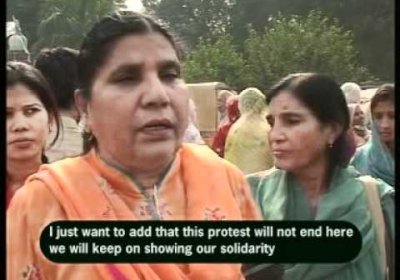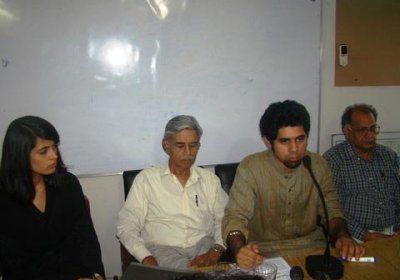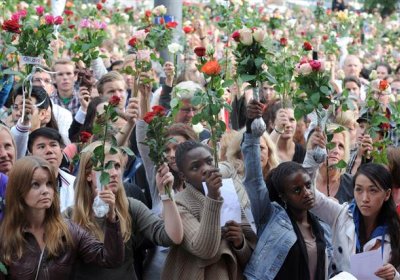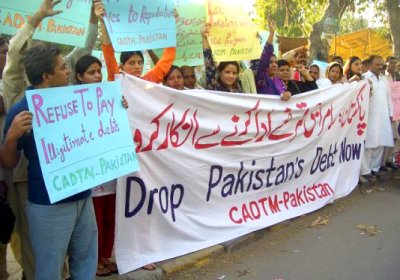Pakistan is witnessing a rise in fanaticism. Ever since last year’s electoral victory of the right-wing Pakistan Muslim League-N (PML-N) and Pakistan Tehreek-Insaaf (PTI), right-wing ideas have become more popular.
Banned terrorists networks are able to work publicly using different names, or sometimes even under their own name. There is no state control of their activities.
With this right-wing turn, the mosques are full of worshipers. More and more young men grow beards to show their identity as Muslims. Religion is used to silence arguments. Violence has become a norm.
Farooq Tariq
A right-wing wave swept Pakistan in the May 11 general elections. At the federal level, the conservative Pakistan Muslim League-Nawaz (PMLN) will form the government having won 35% of the vote.
Former Pakistani cricket captain Imran Khan's party, Pakistan Tehreek Insaaf, came second with 19% of the vote and surprised many. The Pakistan People’s Party (PPP), the ruling party for the past five years, came third with only 15% ― thanks to Sindh where it was able to fetch most of its votes.
For 9 months, Baba Jan Hunzai and 4 fellow activists have languished in Pakistani jails, charged with terrorism offences, and suffered torture. Their crime? Organising the oppressed local community to struggle for compensation, after their villages were submerged by a climate-change induced landslide.
Power loom workers in Faisalabad went on a series of major strikes and demonstrations in mid-2010. Six leaders the Labour Qaumi Movement (LQM, the organisation of Faisalabad power loom workers) were arrested by the police.
Left-wing political parties, trade unions, social activists and student groups at a press conference in the Labour Party Pakistan (LPP) office invited people to join them in an Occupy Lahore anti-capitalist camp at Nasir Bagh in the city centre. The camp will continue for at least two days. A program for the camp will be announced soon.
The camp is being set up in solidarity with the worldwide Occupy movement and the growing unrest among peoples caused by the global economic recession.
Baba Jan, a federal committee member of the Labour Party Pakistan (LPP), surrendered himself to an "anti-terrorist court" in Gilgit Baltestan in early September.
He had been on the run after police opened fire on a demonstration demanding compensation for those affected by the Atta Abad Lake floods last year, killing two
Jan has since been taken from jail and the LPP fears the Inter Services Intelligence (ISI) is torturing him.
Jan’s “crime” was to organise rallies and demonstrations against the police killings.
Farooq Tariq, a spokesperson for the Labour Party Pakistan, released this article on July 24. It is reprinted from Europe Solidaire Sans Frontières.
In the first four days after Osama bin Laden’s assassination by US forces, the mass reaction in Pakistan is very mixed.
In Punjab there is a general sympathy towards bin Laden, but not many are expressing it openly. In Sindh, the responses differ in different cities. For example, in Karachi there is more active commiseration for bin Laden and condemnation of the US attack.
Surprisingly, not much happened in Khaiber Pakhtoonkhawa, where bin Laden was killed. Similarly, Baluchistan responded meekly against the killings.
The recent devastating floods in Pakistan, which affected the lives of more than 20 million people, has once again revealed the severe poverty its people are facing.
The only property that many hundreds of thousands were left with after fleeing their mud homes was just a trunk, a few clothes, pottery and maybe a donkey, cow or buffalo.
A multi-party conference in Lahore on August 29 has launched a campaign to cancel Pakistan's crippling foreign debt and to organise mass rallies in Lahore, Karachi and Islamabad. The first rally took place on September 2 in Islamabad.
The Labour Relief Campaign, in association with Oxfam Pakistan, called the conference to discuss the issue of debt repayment in the post-flood scenario. It was chaired by Aman Kariaper and Ammar Ali Jan.
Senator Hasil Bezinjo vowed to take the issue to Pakistan’s Senate and present a resolution to demand that government refuse to pay the foreign debt.
By August 12, more than 20 million people had been affected by the floods in Pakistan. Waters remained at dangerous levels in several parts of the country, with more torrential rains forecast by the weather department.
This has been one of the most devastating floods in world history. The UN has once again appealed for donations for Pakistan. But the international response has been slow.
On July 6, while 32-year-old Mustansar Rindhawa was listening to a worker who had not been paid his wages by a textile boss, an unknown person with a Kalashnikov entered the front room and fired.
Mustansar tried to save his life by running to the next room, but 10 people were determined to finish him off.
I met Mustansar briefly on June 19 in Faisalabad, less than a month before his murder. He was one of 30 participants in a trade union training course at the Labour Qaumi Movement (LQM) offices.
- Previous page
- Page 3
- Next page










